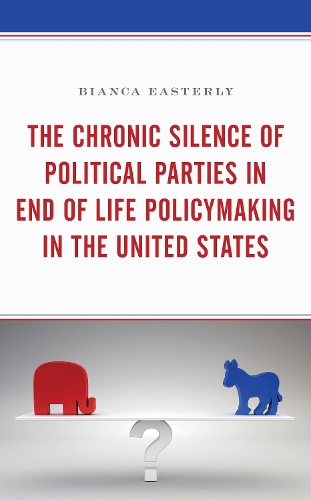
The Chronic Silence of Political Parties in End of Life Policymaking in the United States
(Hardback)
Publishing Details
The Chronic Silence of Political Parties in End of Life Policymaking in the United States
By (Author) Bianca Easterly
Bloomsbury Publishing PLC
Lexington Books
4th June 2019
United States
Classifications
Professional and Scholarly
Non Fiction
Medical and healthcare law
Ethical issues and debates
179.7
Physical Properties
Hardback
140
Width 161mm, Height 231mm, Spine 16mm
367g
Description
In recent decades, the level of moral acceptability of choice at the end of life has reached record highs. Legislative responsiveness to public opinion, however, has resulted in far fewer and much slower adoption patterns. For example, if a growing number of Americans support aid in dying legislation, why are so few states adopting them While extensive research that explores matters of death and dying from the medical, legal, and religious perspectives exists, scholars have yet to consider the role of politics in explaining end of life policy adoption patterns. The Chronic Silence of Political Parties in End of Life Policymaking in the United States retraces the right to die movements legislative history from its beginnings to the adoption and diffusion of its most recent innovationsthe Physician Orders for Life-Sustaining Treatment (POLST) Paradigm and death with dignityto identify the various forces that hinder its progress.
Reviews
Finally, a project that tackles the politics of end of life issues systematically with solid social science theory and attention to detail. Bianca Easterly explores how end of life issues emerge as one-sided morality politics in the American states, fail to be addressed by the national government, and will likely continue to follow a pattern of bottom-up federalism. Solidly researched and described, Easterly has provided valuable insight for scholars, students, and practitioners on a subject that only grows more important as the population ages. -- Donald Haider-Markel, University of Kansas
Author Bio
Bianca Easterly is assistant professor of political science at Lamar University.
